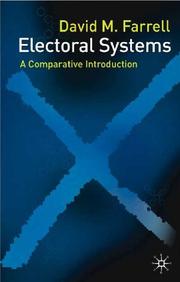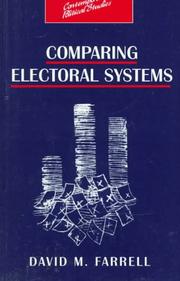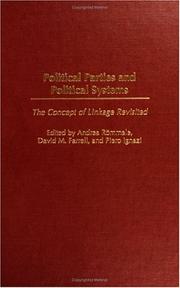| Listing 1 - 10 of 21 | << page >> |
Sort by
|

ISBN: 0333801628 033380161X 9780333801611 9780333801628 Year: 2001 Publisher: Basingstoke : Palgrave Macmillan,
Abstract | Keywords | Export | Availability | Bookmark
 Loading...
Loading...Choose an application
- Reference Manager
- EndNote
- RefWorks (Direct export to RefWorks)
Elections. --- Representative government and representation. --- Elections --- Gouvernement représentatif --- Representative government and representation --- #SBIB:324H42 --- Parliamentary government --- Political representation --- Representation --- Self-government --- Electoral politics --- Franchise --- Polls --- Politieke structuren: verkiezingen --- Constitutional history --- Constitutional law --- Political science --- Democracy --- Republics --- Suffrage --- Politics, Practical --- Plebiscite --- Political campaigns --- Élections --- Système électoral --- Études comparatives --- Élections --- Système électoral --- Études comparatives

ISBN: 0134340779 Year: 1996 Publisher: New York ; London ; Toronto Prentice Hall/Harvester Wheatshear
Abstract | Keywords | Export | Availability | Bookmark
 Loading...
Loading...Choose an application
- Reference Manager
- EndNote
- RefWorks (Direct export to RefWorks)
Elections --- Proportional representation --- Représentation proportionnelle --- Great Britain --- Germany
Book
ISBN: 9781403912312 9780230546783 9781137285508 0230546781 1403912319 Year: 2001 Publisher: Basingstoke: Palgrave MacMillan,
Abstract | Keywords | Export | Availability | Bookmark
 Loading...
Loading...Choose an application
- Reference Manager
- EndNote
- RefWorks (Direct export to RefWorks)
"Electoral Systems examines the six principle types of electoral system currently in use in more than seventy of the world's democracies. A common format is adopted throughout, dealing with explanations of how the system operates and its effects on the political system."--
Elections --- Representative government and representation --- #SBIB:324H42 --- 324 --- Parliamentary government --- Political representation --- Representation --- Self-government --- Constitutional history --- Constitutional law --- Political science --- Democracy --- Republics --- Suffrage --- Electoral politics --- Franchise --- Polls --- Politics, Practical --- Plebiscite --- Political campaigns --- 324 Verkiezingen --algemeen --- Verkiezingen --algemeen --- Politieke structuren: verkiezingen --- Political systems
Book
ISBN: 0333754689 Year: 1998 Publisher: Basingstoke Macmillan
Abstract | Keywords | Export | Availability | Bookmark
 Loading...
Loading...Choose an application
- Reference Manager
- EndNote
- RefWorks (Direct export to RefWorks)

ISBN: 9780199285020 0199285020 Year: 2007 Publisher: Oxford: Oxford university press,
Abstract | Keywords | Export | Availability | Bookmark
 Loading...
Loading...Choose an application
- Reference Manager
- EndNote
- RefWorks (Direct export to RefWorks)
Public law. Constitutional law --- European Union --- Representative government and representation --- Political participation --- Gouvernement représentatif --- Participation politique --- European Parliament --- Elections. --- Elections --- Geografie --- Europa. --- Gouvernement représentatif --- Political sociology --- Representative government and representation - European Union countries --- Political participation - European Union countries
Book
ISBN: 0333558944 0312083963 Year: 1992 Publisher: London Macmillan
Abstract | Keywords | Export | Availability | Bookmark
 Loading...
Loading...Choose an application
- Reference Manager
- EndNote
- RefWorks (Direct export to RefWorks)
324 --- Campaign management --- Political campaigns --- #A9412A --- Campaigns, Election --- Campaigns, Political --- Election campaigns --- Electioneering --- Electoral politics --- Negative campaigns --- 324 Verkiezingen --algemeen --- Verkiezingen --algemeen --- Management --- Campagnes électorales --- Propagande électorale --- Campaign management. --- Political campaigns. --- Propagande électorale --- #SBIB:309H271 --- #SBIB:324H42 --- Politics, Practical --- Elections --- Politieke communicatie: toepassingsgebieden --- Politieke structuren: verkiezingen --- Campagnes électorales --- Gestion
Book
ISBN: 1281154105 9786611154103 0191536458 1435623533 Year: 2007 Publisher: Oxford ; New York : Oxford University Press,
Abstract | Keywords | Export | Availability | Bookmark
 Loading...
Loading...Choose an application
- Reference Manager
- EndNote
- RefWorks (Direct export to RefWorks)
The past 15 years have seen declining public support for European integration, and widespread suggestions that a legitimacy crisis faces the European Union (EU). Many in the EU have believed that this problem could be effectively tackled by vesting greater powers in the European Parliament (EP), the Union's only directly-elected institution. The central argument of this book is that, while considerable efforts have been made to increase the status of the EP, it is in crucialrespects a failure as a representative body. This failure is grounded in the manner in which the parliament is elected. T
Book
ISBN: 9780191862618 0191862614 Year: 2021 Publisher: Oxford : Oxford University Press
Abstract | Keywords | Export | Availability | Bookmark
 Loading...
Loading...Choose an application
- Reference Manager
- EndNote
- RefWorks (Direct export to RefWorks)
Ireland has enjoyed continuous democratic government for almost a century, an unusual experience among countries that gained their independence in the twentieth century. But the way this works has changed dramatically over time. Ireland’s colonial past has had an enduring influence over political life, enabling stable institutions of democratic accountability, while also shaping economic underdevelopment and persistent emigration. More recently, membership of the EU has brought about far-reaching transformation across almost all aspects of life. But the paradoxes have only intensified. Now one of the most open economies in the world, Ireland has experienced both rapid growth and a severe crash in the wake of the Great Recession. By some measures, Ireland is among the most affluent countries in the world, yet this is not the lived experience for many of its citizens. Ireland is an unequivocally modern state, yet public life continues to be marked by ideas and values in which tradition and modernity are uneasy bedfellows. It is a small state that has ambitions to carry more weight on the world stage. Ireland continues to be deeply connected to Britain through ties of culture and trade, now matters of deep concern post-Brexit. And the old fault lines between North and South, between Ireland and Britain, which had been at the core of one of Europe’s longest and bloodiest civil conflicts, risk being reopened. These key issues are teased out in this book, making it the most comprehensive volume on Irish politics to date.
Book
ISBN: 9783832932510 3832932518 Year: 2008 Volume: 8 Publisher: Baden-Baden: Nomos,
Abstract | Keywords | Export | Availability | Bookmark
 Loading...
Loading...Choose an application
- Reference Manager
- EndNote
- RefWorks (Direct export to RefWorks)
Political sociology --- Pressure groups --- Political action committees --- Lobbying --- Political campaigns --- Pressure groups - Europe --- Pressure groups - United States

ISBN: 0275981053 Year: 2005 Publisher: Westport (Conn.) Praeger
Abstract | Keywords | Export | Availability | Bookmark
 Loading...
Loading...Choose an application
- Reference Manager
- EndNote
- RefWorks (Direct export to RefWorks)
Political parties. --- Comparative government. --- Partis politiques --- Institutions politiques comparées --- #SBIB:324H43 --- Politieke structuren: politieke partijen --- #A0511PSA --- Institutions politiques comparées --- Comparative government --- Political parties --- Parties, Political --- Party systems, Political --- Political party systems --- Comparative political systems --- Comparative politics --- Government, Comparative --- Political systems, Comparative --- Political science --- Divided government --- Intra-party disagreements (Political parties) --- Political conventions
| Listing 1 - 10 of 21 | << page >> |
Sort by
|

 Search
Search Feedback
Feedback About UniCat
About UniCat  Help
Help News
News